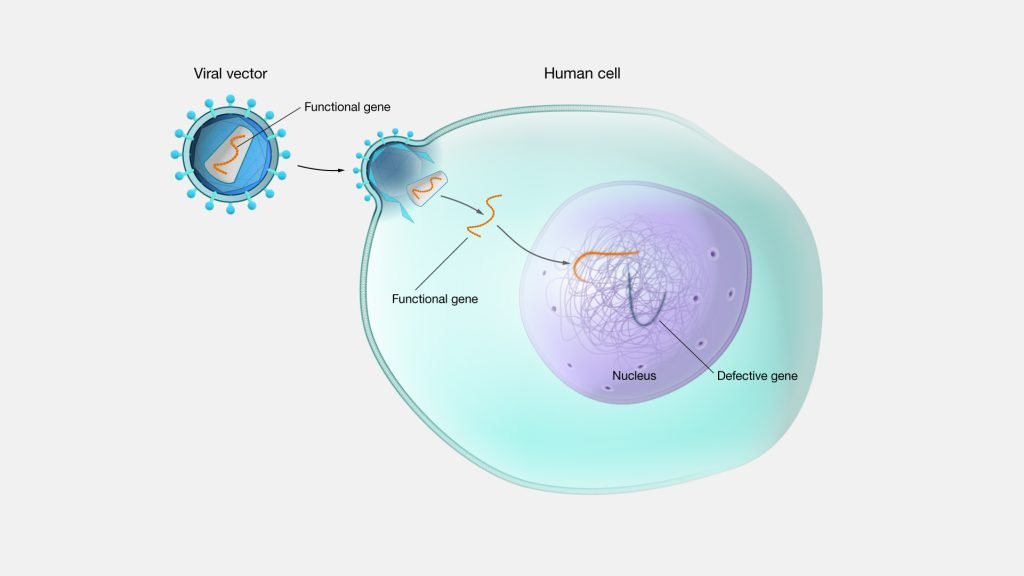Gene Therapy, also referred to as Gene Transfer Therapy, is a revolutionary process where normal genes are introduced into a person’s genome to address genetic mutations or modifications. This technique aims to restore the body’s natural, healthy state, offering a potential cure for a variety of genetic conditions. With its ability to replace mutated genes, gene therapy has become a highly beneficial therapeutic modality that is now being used to treat numerous diseases, improving patients’ conditions significantly.
What is Gene Therapy?
Gene therapy involves inserting, altering, or removing genes within a person’s cells to treat or prevent disease. This could include replacing defective genes with healthy ones, inactivating mutated genes, or introducing entirely new genes that can aid in combating specific conditions. By doing so, gene therapy offers patients hope for conditions that were once considered untreatable through conventional means.
How Does Gene Therapy Work?
The core objective of gene therapy is to either replace, deactivate, or modify genes that are causing a disease. In some cases, gene therapy introduces new genes capable of fighting a particular condition, such as cancer or a genetic disorder.
To deliver healthy genes into a patient’s cells, gene therapy often utilizes viral vectors—modified viruses that do not cause illness but effectively carry the healthy gene into the patient’s cells. Other methods of gene delivery, including plasmids (circular DNA molecules) and liposomes (lipid-based carriers), are also being actively researched.
Gene therapy is most effective when using viral vectors as carriers, but ongoing studies are also exploring alternative approaches, such as nanoparticles and electrical pulses, for gene delivery. These methods enable doctors to address genetic conditions by introducing healthy, functional genes into the affected cells.
What Are the Benefits of Gene Therapy?
Gene therapy offers numerous benefits, particularly for diseases where no reliable treatment options exist. Here are some key advantages:
1. Long-Term Effects
One of the major benefits of gene therapy is that it often provides long-term or even permanent relief from genetic conditions. Once treated, certain conditions may no longer recur, unlike conventional treatments that may require continuous medication.
2. Low Cost and Fewer Injections
Gene therapy typically requires fewer injections compared to traditional treatment options, making it more cost-effective. Since the treatment addresses the root cause of the disease, it can reduce the need for long-term medical intervention.
3. Preventive Benefits for Future Generations
Gene therapy can also prevent the transmission of genetic diseases to future generations. By correcting problematic genes, the risk of passing on these conditions to offspring is eliminated.
4. Safe and Effective
As technology progresses, gene therapy has become increasingly safe and effective, with continuous research enhancing its success rates. It holds great promise as a treatment option for a variety of genetic disorders.
Conditions That Gene Therapy Can Treat
Gene therapy has shown great promise in treating a wide range of conditions, particularly those caused by genetic mutations. Some of the conditions that gene therapy can address include:
Parkinson’s Disease
Gene therapy can help replace or repair defective genes that contribute to Parkinson’s disease, offering a potential new way to slow down or halt the progression of this neurodegenerative disorder.
Muscular Dystrophy
This genetic disorder, which leads to the weakening of muscles, can be treated with gene therapy by introducing healthy genes to replace the faulty ones that cause muscle degeneration.
Kidney Problems
Gene therapy may offer a solution for genetic kidney conditions by targeting and modifying genes responsible for kidney dysfunction, offering hope for patients with chronic kidney disease.
Eye Diseases
Gene therapy is a promising treatment option for certain inherited eye diseases. By introducing healthy genes into the retinal cells, it may restore or prevent vision loss caused by genetic mutations.
Neurodegenerative Diseases
Gene therapy is being explored as a treatment for various neurodegenerative diseases, such as Alzheimer’s and Huntington’s diseases, by modifying the genetic makeup to stop the progression of these conditions.
Immune Deficiencies
Patients with genetic immune deficiencies can benefit from gene therapy, which involves introducing healthy genes to restore proper immune function, potentially preventing recurrent infections.
Why Choose Viezec for Gene Therapy?
At Viezec, we offer advanced gene therapy treatments for a wide range of genetic conditions. With high success rates and a commitment to patient safety, we provide personalized care to ensure the best possible outcomes. Our procedures are backed by extensive research and have helped many patients recover quickly from genetic disorders.
For more information or to schedule a free consultation about Gene Therapy for genetic conditions in Delhi, India, feel free to reach out to us today!



